The Balkans are: free antibiotics for my ear infection, the sweetest nectarines, aggressive drivers, hungry glances at women’s nipples under the thin tops, canopy beds on the beach, remnants of Ottoman culture, fresh fishes from the lake, endless traffic jams, okra in the market, men-only cafes, defenders of the faith, a 100 euro a night campsite in Bled, and humanity.
“This is a chaotic mess, not a country,” declares the small bar owner in Pogradec, Albania. His men-only establishment, with four tables where locals come for coffee and a shot of rakija, undergoes a cultural shock when my friend Alexia, a Greek teacher and feminist originally from Greece, Saden from Karlovy Vary with roots in Iraq, and I walk in. The bartender, Petraqis, originally from Macedonia, recovers from his initial surprise, opens an old fridge, and pulls out a few beers for us.
We’re hungry, but there’s nothing to eat. So Alexia dashes to a nearby shop, buys salad ingredients and eight farm-fresh eggs. Petraqis, now more relaxed, chops vegetables and brings the eggs to his wife, who quickly fries them and sends them back via Petraqis. Passing by is Elijah, an Albanian, who sees our lively gathering and decides to join. Greek, Albanian, German, and Czech all echo around the table.
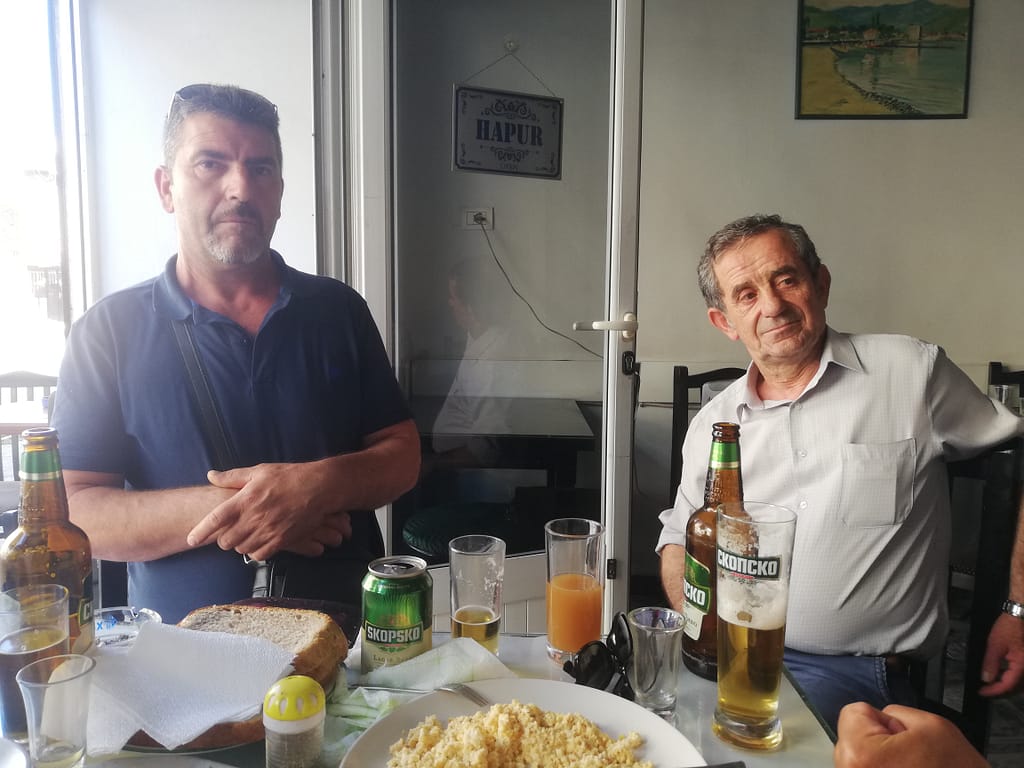
We invite a hesitant Petraqis to join us and begin asking him what life in Albania is like. He’s seen a lot and doesn’t hold back. “We have natural resources here, but everyone just shoots for money. This is a country for the rich, not the poor. I’ve worked for 38 years, and I get a pension of 180 euros. Mafia is everywhere here. You bribe a minister, and you get what you want.” Saden, born and raised in Baghdad with 11 siblings and a total of 176 close relatives, jumps in, “In Syria, the pay is 11 dollars a month.” At this, Elijah tears up; his mother is dying of Alzheimer’s. We comfort him and think of our own mothers. As the beer disappears and the rakija in our glasses dwindles, Elijah, a father of two, tries to hold Alexia’s hand, and Saden brushes a strand of hair from my forehead, sighing that I remind him of a long-lost student. Alexia and I exchange a look, and we slip out of the bar before anyone realizes what’s happened. Petraqis runs after us, shakes our hands ceremoniously, and tells us we’re always welcome at his men-only bar. He hasn’t had so much fun in ages.
Beetle Through the Balkans
It’s been nearly a week since I arrived to meet Alexia in Germany, where she’s studying classical archaeology in a small town on the Danube. A long journey through the Balkans awaits us in a small black Volkswagen Beetle. Alexia boils eggs, bakes a vegetable quiche, layers sandwiches, and blends some hummus. We turn the car into a convertible and head toward Salzburg. Unfortunately, still in Germany, the side window jams in a lowered position and won’t come up. We visit three garages and finally end up at Audi with a balding mechanic, who raises the window by hand and advises us to secure it with a wooden block since the replacement part won’t arrive for a week. Do we dare take a car across the Balkans that, according to the Audi expert, is a “thief’s invitation”?
At Lake Bled in Slovenia, everything is forbidden: jumping into the water, eating, swimming, breathing, even walking. Camp Šobec is the only campsite late at night with a spot for a tent. But they want us to pay for at least two nights, even though we don’t plan to stay that long. The young woman at reception explains that the camp’s policy is designed to make people stay as long as possible. One night in our own tent during a storm would cost us 120 euros, so we pack up and leave.

Flooded Roads
Driving on the highway to Zagreb, through stormy weather and water pooling on the road. In the Croatian town of Šibenik, they say there’s a fire and shit floating in the sea. None of it’s true when I walk up to Saint Michael’s Fortress. Dreamy Šibenik is replaced by Split with Diocletian’s Palace, but the crowds of tourists are overwhelming, so we retreat at 60 kilometers per hour to Bosnia and Herzegovina. My attempt to enter Bosnia is not successful. I drive past the customs booth without stopping, and the border guard chases after me, explaining, red-faced, that I’ve just entered “another country” and must undergo passport control. Luckily, I’m neither jailed nor is Alexia’s convertible impounded for its German license plate, which has caused us no end of trouble.
The Plastic Throne
Before entering Montenegro, Alexia calls her student Dragan, a businessman originally from Tivat, Montenegro, who lives in Prague but would rather be in Greece, to see if he’s nearby. Dragan’s in Greece but arranges accommodations and meals for us with friends, a couple who run a family hotel near the Albanian border in Ulcinj. Back in 1968, this was a favorite seaside spot for Czechoslovaks, but it’s since been forgotten by both Czechs and Slovaks. The drive from Tivat to Ulcinj takes forever because the only coastal road is hopelessly congested. “If Montenegrins used their blinkers, it’d probably disrupt the balance of the universe,” Alexia complains as she drives. But we feel at home with the Pavlović family. Branka and Mihajlo greet guests this summer just as they have for the past 30 years, sitting side by side on white plastic chairs like ancient royalty on thrones, and we bow low in gratitude. Ulcinj boasts a vast sandy beach, where, for thirty euros, we get a bed with a canopy. We wade into the sea up to our noses, treading water while Alexia tells me about her grandmother, a partisan who fought with a machine gun in the Greek Civil War, raised dozens of grandchildren, and knew the mountains like the back of her hand.
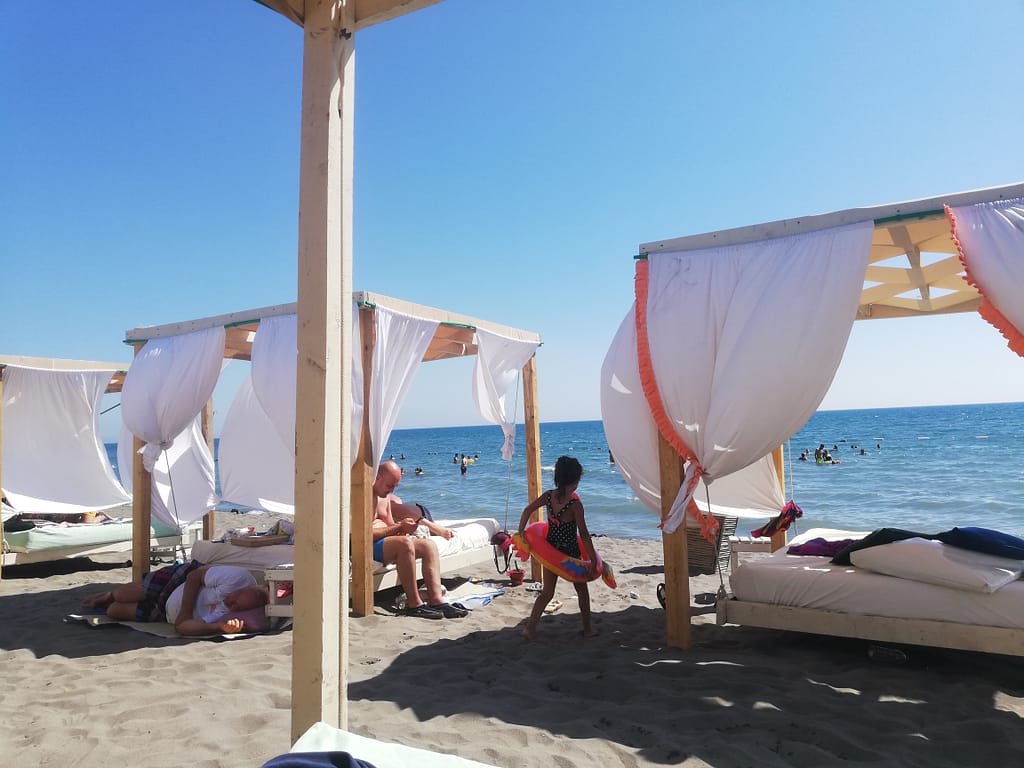
Don’t Go to Albania
“Don’t go to Albania! It’s hot and the roads are terrible. If you have to go, avoid going out at night, especially not to bars. People sometimes disappear there,” Branka and Mihajlo warn us. We wave off any doubts and drive into a country of relentless drivers, excellent food, drug dealers, and boundless hospitality. Passing through the infamous Elbasan, we sing along to our Spotify playlist: “Mountain climbers, mountain climbers, don’t climb that sharp peak.” We stay in Pogradec and soon meet Saden, a Czech-speaking traveler on a road trip to Iraq.
In Greece, Something Happens Every Decade
Across Albania, we gaze toward Greece, which is in Alexia’s blood and my heart. She shatters my romantic notions of a land promised to the Greek gods, one by one. “Did you notice how Saden didn’t want to talk about joining the communists in the late 1970s?” Alexia asks. “In Iraq, that was the only way to fight for freedom and gain an education. He would have been executed if he hadn’t emigrated.” Alexia’s mother calls, recounting how gypsies in Athens stole her stuff from her car. She tracked some things through her iPhone, but it led her into a gypsy no-go zone, where the police wouldn’t dare enter. Some items were found in a dumpster by her boyfriend, a Slovak named Luboš, who muttered curses as he rummaged through the mess. “When will Greece finally learn to flush its damn toilet paper?” he demands rhetorically.
Madame Bovary
I part with Alexia in Greek Kastoria as she heads to her family. I take a bus to Konitsa, a mountainous area near the Albanian border. I know no one, and the surrounding forests are said to teem with wolves and bears. Amidst this wilderness, Konitsa feels like stepping into Gustave Flaubert’s Madame Bovary. I’m surrounded by young people whose souls seem weathered and wise, intertwined with the meanders of the Aoos River and the lives of their ancestors. My companion here is Konstantin, my Airbnb host. Greek hospitality absorbs me like a sponge. Konstantin’s uncle Stavros, a former truck driver, pops in briefly; he’s embarrassed by his limited English and quickly leaves. A local eccentric in a pink shirt is muttering to himself. I nod a greeting to a somber priest as Konstantin waves to the watermelon vendor. Konstantin is the intellectual here. He studied English and makes his living from it. He asks me when I celebrate my birthday. When I say September, he comments, “Ah, you’re a Virgin.” I smile politely. Not a virgin anymore, though.
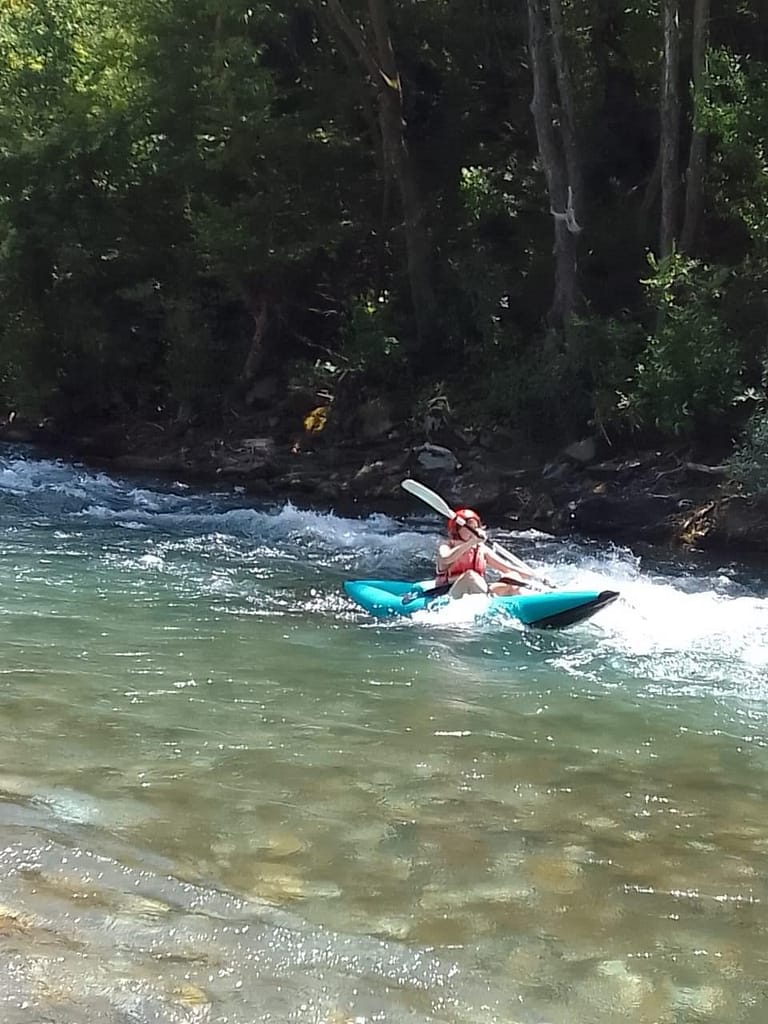
Shut Up and Paddle
The next day, I’m set to begin a weeklong stay at Nikos’s No Limits camp—a place recommended by Alexia. It offers treehouse sleeping, white-water rafting down the wild Aoos River, and mountain hiking. There’s no way to find out about it without knowing Greek, as Nikos isn’t keen on foreigners. He doesn’t have much choice with me, though, as I’m already here in Konitsa. He even begrudgingly drives me to the camp in his old car, his dog Hermes licking my face the whole way. This isn’t exactly a camp: it’s a wooden shed and three small treehouses nearby. The treehouses are supposedly all booked, so I end up in the shed, sleeping on a not-so-clean bunk. Nikos runs the place with Hermes and an Albanian worker, Florian, who takes on the hardest work to support his wife and two sons.
I’m not concerned about the sleeping arrangements or the lack of food—these trivialities don’t matter much when the clearest river and beautiful mountains are right outside. That afternoon, I’m wandering along the riverbank, watching Nikos send off a school trip on three large rafts. When he spots me, he offers to let me join them. Thrilled, I agree, but instead of putting me on one of the rafts, he points to a single kayak, tosses me a paddle, and gruffly asks if I’ve done it before. Lacking the courage to admit I haven’t, I nod confidently. Nikos shoves me off after the retreating rafts, and from that moment on, I’m in the hands of fate.
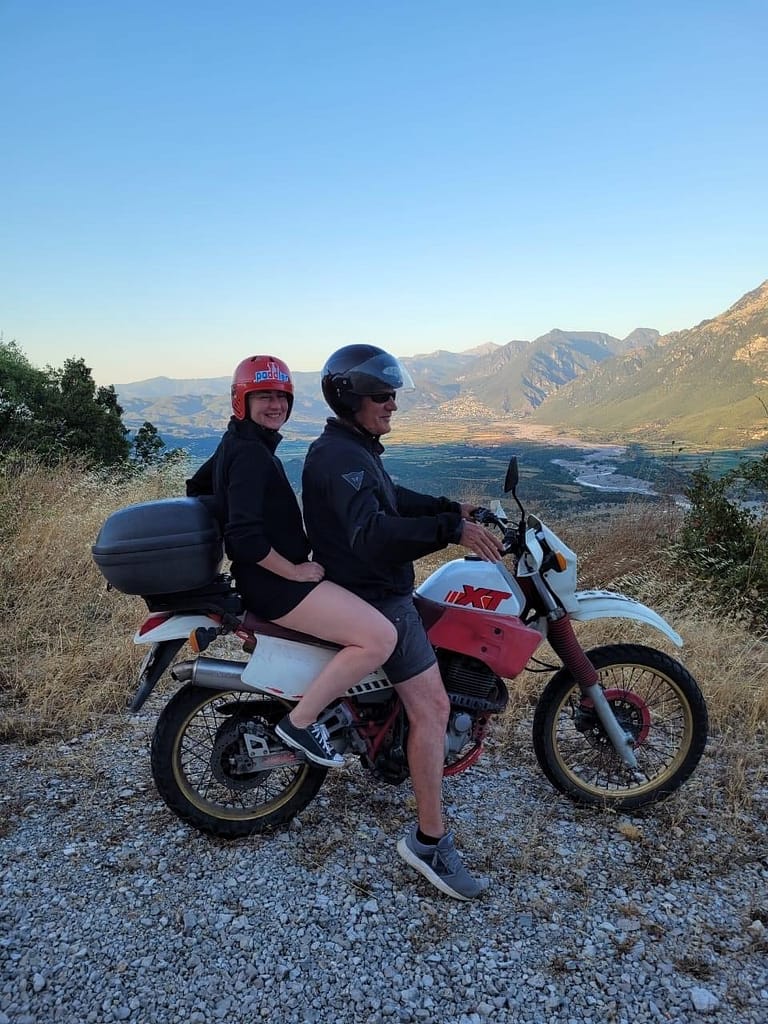
To this day, I don’t know how I made it through that stretch of rapids, rocks, and fallen trees. People from the rafts tried to guide me, but it was no use—I just let myself drift with the water, which, apparently, is the exact wrong thing to do. Nikos eventually pulled me out at the designated spot like a drowned cat, but the experience somehow confirmed our unequal friendship. For the rest of my stay, Nikos affectionately calls me „Tséka“, takes me out for sunset motorcycle rides in the mountains, and pours ouzo in the evenings while trying to pull me into Greek conversations with the other campers. When I leave after a week, he half-jokingly warns me not to come back until I can speak Greek fluently.

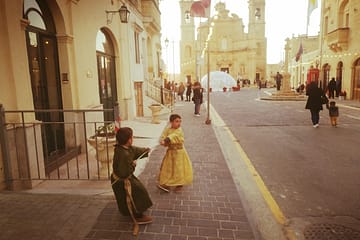
0 Comments